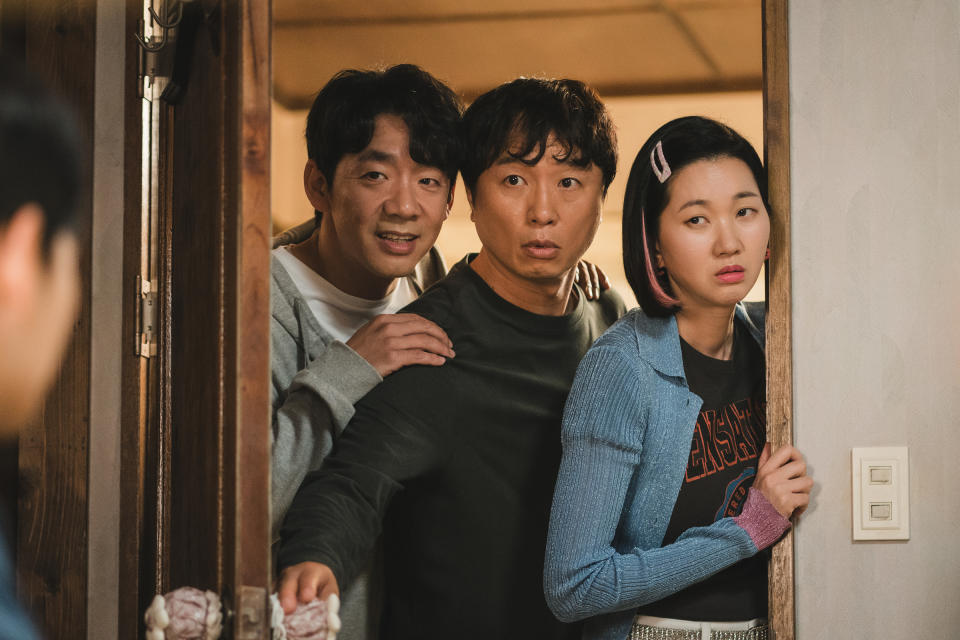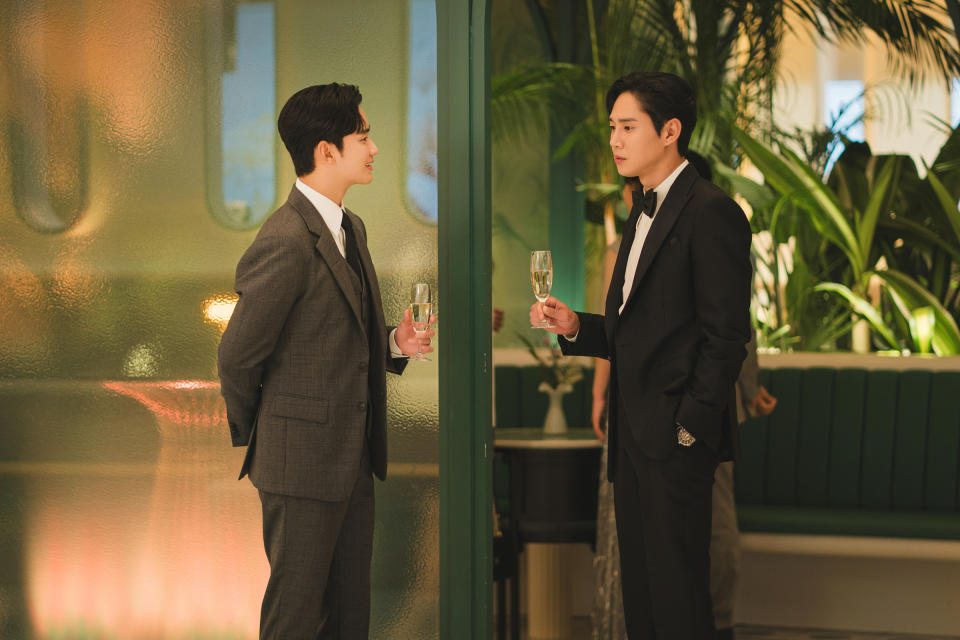Queen of Tears' Finale Fails to Stick the Landing
Warning: This story includes spoilers for most of Queen of Tears.
Queen of Tears is a K-drama of two halves. The first, composed of its early episodes, is an innovative take on K-romance. The other is a chaotic second half that squanders much of the potential of its beginning. The Netflix hit ended Sunday with a global audience that exceeded that of the wildly popular Crash Landing on You (also written by Park Ji-eun). But by the time the credits rolled, Queen of Tears was almost indistinguishable from every K-drama that came before it.
When we left Hyun-woo (Kim Soo-hyun) and Hae-in (Kim Ji-won) at the end of episode 8, the latter had just been refused life-saving treatment in Germany for the brain tumor she was diagnosed with earlier in the series. After antagonist Eun-sung (Park Sung-hoon) reveals Hyun-woo’s earlier plans to divorce his wife, the couple is once again estranged while Eun-sung and his mother, Moh Seul-hee (Lee Mi-sook), complete a coup of Queens Group by poisoning Hong patriarch Man-dae (Kim Kap-soo). Hae-in and Hyun-woo are forced back together when her family takes refuge with his.
Queen of Tears takes this opportunity to humanize the Hongs. Considering how overt this show has been about how horrible its villains are, this shouldn’t work, yet, as they acclimatize to a poorer life, it somehow does. We begin to sympathize with these awful, entitled people. But this is also where Park starts to lose control of the narrative.
Giving Hae-in’s family room to grow is a brave move given how objectively appalling their behavior was in the first half of the series, but in expanding the narrative to encompass multiple perspectives, Queen of Tears gives itself too much to do. This is compounded by the absurdism that is introduced when the characters are given a string of past connections, as it’s revealed that Eun-sung and Hong Seo-cheol’s (Kwak Dong-yeun) wife, Da-hye (Lee Joo-bin), lived at the same orphanage where they both hatched plans to infiltrate the Hong family. Meanwhile, Seul-hee had been plotting her takeover for decades, including the murder of Seon-hwa’s (Na Young-hee) son. That incident also almost killed Hae-in, but Hyun-woo—who just happened to be attending a Marine Corp children’s camp (which is apparently a thing and not ghoulish at all)—rescues her. The two, Seon-hwa later remarks, were destined to be together. It’s an unfortunate premonition of how much of a mess Queen of Tears will need to clean up by its end.
Read more: The Netflix Korean Dramas to Look Out for in 2024

Despite this muddying of perspectives, the series remained strong well into its second half. Those early episodes cast a long shadow and moments of intense emotion still wove their way in. Hae-in’s reconciliation with her mother, though difficult, is heartbreaking. Similarly, although the introduction of Da-hye’s abusive ex-partner is one more example of an absurdly evil character designed to make everyone else look good, Lee gives so remarkable a performance throughout Queen of Tears’ second half that it doesn’t derail Da-hye’s own narrative. Through moments like this, the potential of Queen of Tears lingers just below the surface, though it is soon to be obscured by the increasingly chaotic plot.
For a while, everything is held together by the threat to Hae-in. At least while her health deteriorates, there is a powerful emotional core to every scene. But when Hyun-woo receives news of a new miracle surgery, it quickly becomes clear that Queen of Tears has lost its nerve. Worse, this operation will damage Hae-in’s hippocampus and make her lose her memories. It’s a limp effort to maintain the stakes around Hae-in as Park destroys the driving emotional force of the series.
Interestingly, we do get one last reminder that Hyun-woo is a reprehensible character in his own right, as he keeps information on this side effect from Hae-in—and, consequently, the ability for her to consent to the procedure fully informed of its sobering side effects—until the last minute. None of which matters because the operation is a success, her tumor is gone. But, as predicted, Hae-in wakes up unable to remember anything—well, this is how it’s clumsily framed but, in fact, she’s only unable to remember the people around her and she quickly makes a specific reference to Mother Teresa, which is especially jarring. From this point, the series starts its slow, inevitable, and disappointing crawl toward a cliched, happy ending.
It feels odd to say they should have killed Hae-in, but once the threat to Hae-in’s life is revealed to be hollow, everything that follows lacks stakes. It becomes hard to care about the dangers that emerge in the last two episodes—including an almost two-hour finale—because we know the series has already shied away from delivering an emotional gut punch. In letting its foot off the gas with more than three hours left to go, it’s so hard to believe that when Eun-sung has Hyun-woo arrested and takes his place beside Hae-in, it might amount to anything. When Hyun-woo (who has no trouble proving his innocence, because Eun-sung is comically inept at everything) is hit by a car in the penultimate episode’s cliffhanger, we know he’ll be fine. When Eun-sung kidnaps Hae-in, of course Hyun-woo will rescue her, of course Eun-sung will get his comeuppance, of course everything will work out—the final end card even says “Happy Ending”—we’ve been here before in dozens of other K-dramas.
Read more: The 8 Best Korean Dramas on Netflix Right Now

The many issues that arise following Queen of Tears’ initial promise speak to a wider trend in South Korean TV. Many promising series either don’t seem to know how to close out their stories or fall into what’s expected in a landscape driven by tropes and cliches. In the last year alone, Doona! squandered an initial masterclass in bittersweet storytelling that almost said something about the South Korean music industry to become just one more drama full of problematic relationships and derivative storylines. See You in My 19th Life started with just as much promise as Queen of Tears and, despite a stunning performance from Shin Hae-sun, just couldn’t close out its time-travel hijinks with a satisfying conclusion. K-dramas have their fair share of innovation and variations on the formula, but they seldom endure past a series’ first few episodes.
That said, South Korean TV does resist change on the whole, preferring instead to emulate past success. But then, so do fans. Consider Twenty-Five Twenty-One, a rare series that did stick the landing with an unconventional ending, only to be review-bombed for the trouble. Of course, every creator has the agency to write their endings as they see fit, but it’s important to acknowledge that many Korean creatives may feel diminishing returns for doing so thanks to an intense fandom that doesn’t always seem to want or welcome change.
It’s a sad note on which to end the conversation about a series that, only a few weeks ago, looked like it could end up as one of the best K-dramas we’ve ever seen. Indeed, there might have been a remarkable 10-episode drama about two people on the cusp of separation rediscovering each other under the cloud of mortality, one that could have been groundbreaking with tighter writing and a stronger resistance to the temptation of the familiar. While the show we ended up with remains compelling, even fun, to the end, the decision to dispense with its profoundly tragic and emotional core makes the endeavor more rote and, at times, even boring. The series never recaptures the rare thrill of its early episodes and, ultimately, in fixing Hae-in’s brain, Queen of Tears loses its heart.
Contact us at letters@time.com.

 Yahoo News
Yahoo News 
